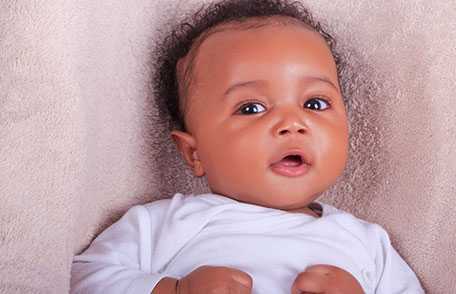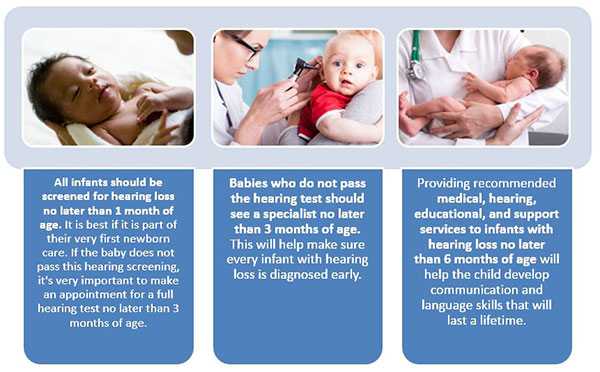Can your baby hear you say “I love you?”

Find out why hearing screening is important, how to get your baby screened, and what to do with the results. Also included are helpful resources for parents.
Thousands of babies are born deaf or hard of hearing each year in the United States. Babies diagnosed early with hearing loss and begun on intervention are more likely to reach their full potential. The best way to find out if your baby may be deaf or hard of hearing is by a simple hearing test, also called hearing screening.
Why is a hearing screening important for my baby?
Starting from day 1, babies begin to learn language skills by listening to and interacting with those around them. If babies miss these opportunities, their language development can be delayed. Many times, children’s hearing loss is not obvious and can go unnoticed for months or even years.
Hearing screening at birth can determine if your baby may have a hearing loss and if more tests are needed. Early diagnosis is essential to help babies who are deaf or hard of hearing reach their full potential. Early diagnosis allows families to make decisions about the intervention services that are best for their baby’s needs. Early diagnosis of hearing loss and beginning intervention helps to keep children’s development on track and improve their future language and social development.
Your Baby Probably Had a Hearing Screening
Almost all states, communities, and hospitals now screen newborns for hearing loss before the babies leave the hospital. The hearing screening is easy and painless, and it can determine if more testing is needed. In fact, many babies sleep through the hearing screening, and the test usually takes just a few minutes.
What if my baby did not pass the hearing screening?
Additional testing is the next step to tell if your baby has a hearing loss and what type of loss it is. A healthcare professional trained to test hearing, such as an audiologist, will be able to perform more detailed hearing tests. Your baby’s doctor (or an ear, nose, and throat doctor) should perform or order any medical tests needed to find out the cause of the hearing loss.
If my baby passed the hearing screening, is everything fine?
Because a newborn baby can pass the hearing screening and still develop a hearing loss later, your baby’s doctor should routinely follow your baby’s general health and development.
For more information, visit CDC’s Early Hearing Detection and Intervention (EHDI) website.

View large image and text description
Where can I go for help?
Every state has a program that works to help make sure that deaf and hard of hearing babies are diagnosed early. If your baby is deaf or hard of hearing, or if you have any concerns about your baby’s hearing, call toll free 1-800-CDC-INFO or visit the CDC EHDI Program site to learn more about this topic.
The Centers for Disease and Control and Prevention’s (CDC’s) Early Hearing Detection and Intervention (EHDI) program works with your state to ensure that all babies are screened for hearing loss and receive any needed follow-up tests and services. CDC’s EHDI program supports the ongoing search for new ways to improve services. To learn more about CDC’s important role in helping deaf and hard of hearing children, download a fact sheet [192 KB] and watch a video in American Sign Language.
More Information
Listen to a podcast in English [PODCAST – 10:46 minutes] or in Spanish [PODCAST – 13:11] on Early Hearing Detection and Intervention
- Page last reviewed: May 17, 2017
- Page last updated: May 17, 2017
- Content source:
- National Center for Chronic Disease Prevention and Health Promotion
- Page maintained by: Office of the Associate Director for Communication, Digital Media Branch, Division of Public Affairs




 ShareCompartir
ShareCompartir